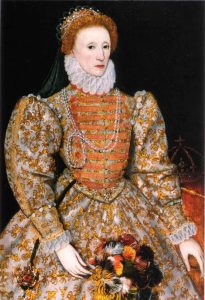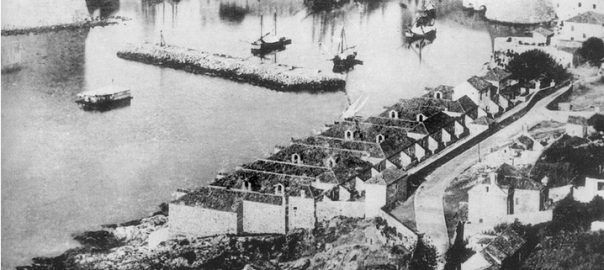Not much happened in 1558 CE. Perhaps the fact that the global flu pandemic that had broken out the preceding year continued to rage throughout 1558 had something to do with that? (Above is a historic photo of the quarantine station built at Dubrovnik harbor in 1590, but Europeans and Ottomans had known a lot about the use of quarantines to slow the spread of disease, for a number of centuries by then. The indigenous people of the “New World” were unable to mount any such defenses against the transmission of diseases to their shores by their European invaders… )
Anyway, the two things of world-historical impact that did happen in 1558 both had to do with England (not yet a world power):
- In January, French troops captured from the English the town and region of Calais, ending an era of English rule that had lasted since 1360. Under the English, Calais had representation in the English parliament and was described by some as “the brightest jewel in the English crown.” But. maintaining its defenses was an expensive business and the late-20th century historian Geoffrey Elton would say, “Calais—expensive and useless—was better lost than kept.” In 1558, England’s Queen Mary took the news hard, reportedly commenting “When I am dead and opened, you shall find ‘Philip’ [her husband] and ‘Calais’ lying in my heart.” Calais had been the last English-controlled territory on the continental mainland so thereafter the English had to look elsewhere for expansion…
- In November, Queen Mary was dead, quite possibly of the flu. There was apparently little contestation over who would succeed her. One main claimant to the throne could have been her husband/widower, King Philip II of Spain. But English-WP tells us that when his wife fell ill in 1558, King Philip sent an envoy to consult with Mary’s 25-year-old sister Elizabeth– who had been explicitly named by Henry VIII, before his death, as next in line for the succession after Edward VI and Mary. These contacts were seemingly satisfactory to both sides: “By October 1558, Elizabeth was already making plans for her government. On 6 November, Mary recognised Elizabeth as her heir. On 17 November 1558, Mary died and Elizabeth succeeded to the throne.”

I wonder at what point Philip regretted his 1558 decision? Anyway, he was still trying to deal with not just the flue pandemic but also the collapse of Spain’s finances, so maybe trying to hang onto an always distrustful England would have been too much bother. Elizabeth as we know would rule with some success for 45 years, launching the English Empire, destroying the Spanish Armada, and never marrying. The long period of her rule was almost coterminous with that of the Mughal Emperor Akbar (1556-1605), but she started out as already an adult.
